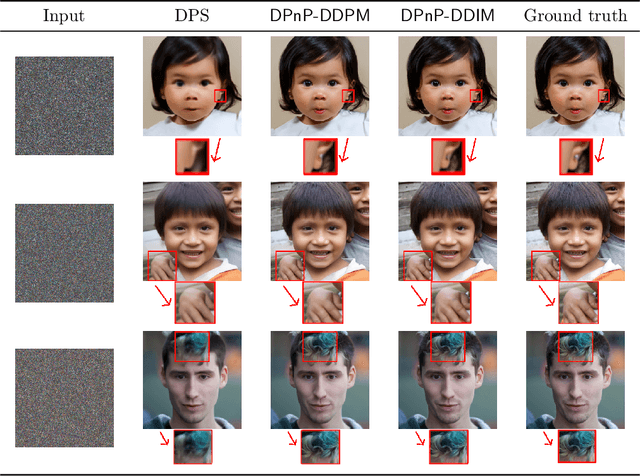Provably Robust Score-Based Diffusion Posterior Sampling for Plug-and-Play Image Reconstruction
Paper and Code
Mar 25, 2024

In a great number of tasks in science and engineering, the goal is to infer an unknown image from a small number of measurements collected from a known forward model describing certain sensing or imaging modality. Due to resource constraints, this task is often extremely ill-posed, which necessitates the adoption of expressive prior information to regularize the solution space. Score-based diffusion models, due to its impressive empirical success, have emerged as an appealing candidate of an expressive prior in image reconstruction. In order to accommodate diverse tasks at once, it is of great interest to develop efficient, consistent and robust algorithms that incorporate {\em unconditional} score functions of an image prior distribution in conjunction with flexible choices of forward models. This work develops an algorithmic framework for employing score-based diffusion models as an expressive data prior in general nonlinear inverse problems. Motivated by the plug-and-play framework in the imaging community, we introduce a diffusion plug-and-play method (\textsf{DPnP}) that alternatively calls two samplers, a proximal consistency sampler based solely on the likelihood function of the forward model, and a denoising diffusion sampler based solely on the score functions of the image prior. The key insight is that denoising under white Gaussian noise can be solved {\em rigorously} via both stochastic (i.e., DDPM-type) and deterministic (i.e., DDIM-type) samplers using the unconditional score functions. We establish both asymptotic and non-asymptotic performance guarantees of \textsf{DPnP}, and provide numerical experiments to illustrate its promise in solving both linear and nonlinear image reconstruction tasks. To the best of our knowledge, \textsf{DPnP} is the first provably-robust posterior sampling method for nonlinear inverse problems using unconditional diffusion priors.
 Add to Chrome
Add to Chrome Add to Firefox
Add to Firefox Add to Edge
Add to Edge